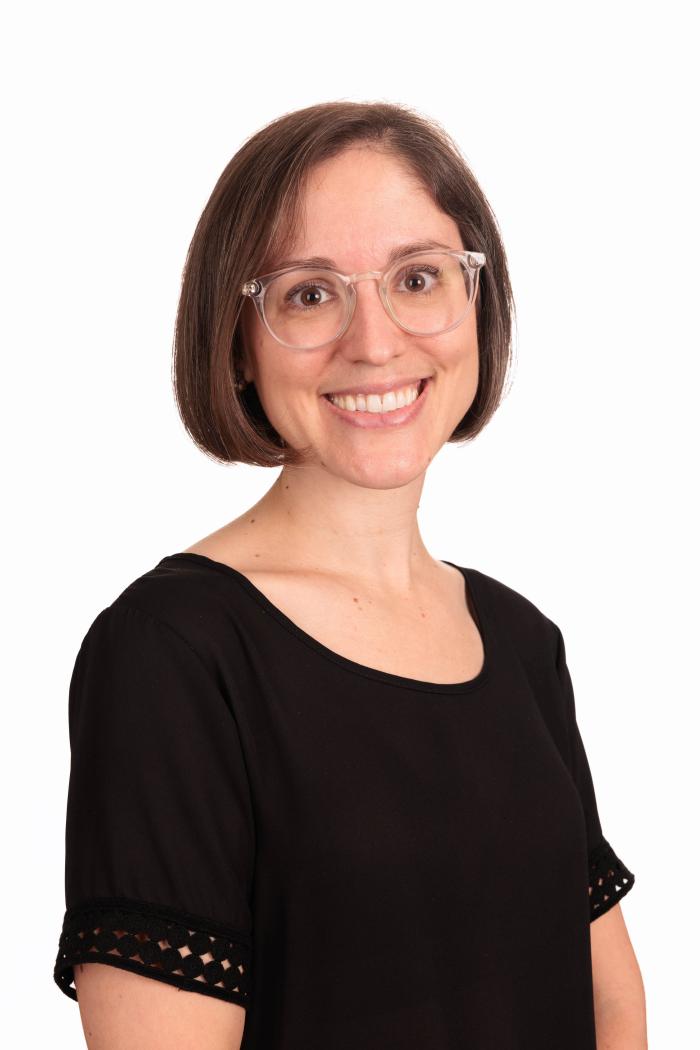Mackenzie Fama

Mackenzie Fama
Assistant Professor
Full-time
Contact:
Mackenzie Fama, Ph.D., CCC-SLP is an Assistant Professor in the Department of Speech, Language, and Hearing Sciences at The George Washington University. Her research focuses on aphasia, a language disorder commonly acquired through stroke or other brain injury. She is a licensed speech-language pathologist and has experience working in inpatient and outpatient rehabilitation and in a community-based aphasia center.
- Aphasia
- Adult acquired neurogenic disorders
- Neural bases of language processing
Ph.D., Neuroscience, Georgetown University
M.S., Speech-Language Pathology, University of North Carolina at Chapel Hill
B.A., Linguistics and Philosophy, The College of William and Mary
- Member, American Speech-Language-Hearing Association (ASHA)
- Member, ASHA Special Interest Group 2: Neurophysiology and Neurogenic Speech and Language Disorders
- Member, Aphasia Access
- Member, Academy of Aphasia
- Licensure in speech-language pathology in DC, MD, and VA
- Professional Advisory Council, Stroke Comeback Center
- Secondary faculty appointment in the Department of Rehabilitation Medicine, Georgetown University Medical Center
- Ad-hoc peer reviewer for relevant publications, including:
- Brain and Language
- Journal of the International Neuropsychological Society
- Journal of Communication Disorders
- Language, Cognition and Neuroscience
Dr. Fama leads the Fama Aphasia Recovery Lab (Hall of Government, Room 221a). Her research interests include the experience of inner speech in individuals with aphasia, group therapy for aphasia, and the brain basis of various aspects of language processing.
Fama, M. E. & Meier, E. (2024). Picturing Better Materials: Normative Data on a Novel Illustration Set for Scientific and Clinical Use. American Journal of Speech-Language Pathology, 33, 2645-2652. https://doi.org/10.1044/2024_
Fama, M. E., McCall, J. M., DeMarco, A. T., and Turkeltaub, P. E. (2024). Evidence from Aphasia Suggests a Bidirectional Relationship between Inner Speech and Executive Function. Neuropsychologia, 204, 108997. https://doi.org/10.1016/j.
Fama, M. E., *Schwartzman, S., *Metzler, E., ^Coyle, S., & ^Hatfield, B. (2024). Self-reported longitudinal impacts of the COVID-19 pandemic on adults with acquired communication disorders. International Journal of Speech-Language Pathology. Advance online publication. https://doi.org/10.1080/
Fama, M. E., Schuler, K., Newport, E.L., and Turkeltaub, P. E. (2022). Effects of left hemisphere stroke and healthy aging on statistical language learning. Language, Cognition and Neuroscience, 37(8), 984-999. https://doi.org/10.1080/
Fama, M. E., Levinson, G., and Lemonds, E. (2022). The subjective experience of word-finding difficulties in people with aphasia: A thematic analysis of interview data. American Journal of Speech-Language Pathology Special Issue: Selected papers from the 50th annual Clinical Aphasiology Conference, 31(1), 3-11.
Fama, M. E., Hatfield, B., Coyle, S., Richman, M. S., and Georgeadis, A. C. (2021). The Impact of the COVID-19 Public Health Crisis on Communication and Quality of Life: Insights from a community of stroke and brain trauma survivors. American Journal of Speech-Language Pathology, 30(4), 1805-1818.
Fama, M. E. & Turkeltaub, P. E. (2019). Inner speech in individuals with aphasia: Current evidence, clinical implications, and future directions. American Journal of Speech-Language Pathology, 29, 560-573.
Fama, M. E., Henderson, M. P., Snider, S. F., Hayward, W., Friedman, R. B., and Turkeltaub, P. E. (2019). Self-reported inner speech relates to phonological retrieval ability in people with aphasia. Consciousness and Cognition, 71, 18-29.
Fama, M. E., Snider, S. F., Henderson, M. P., Hayward, W., Friedman, R. B., and Turkeltaub, P. E. (2019). The subjective experience of inner speech in aphasia is a meaningful reflection of lexical retrieval. Journal of Speech, Language, and Hearing Research, 62, 106-122.
For a complete list of publications, please see this link
- SLHS 3135: Language, Structure, Meaning, and Use
- SLHS 6210: Research Methods in CSD
- SLHS 6240: Neurogenic Communication Disorders
Internal Funding (Active)
- 2024 – 2025 Fama, M. E. “Inner speech and task-switching ability in aphasia”. Internal Seed Grant, Department of Speech, Language, and Hearing Sciences, The George Washington University.
External Funding (Completed)
- 2022 – 2024 Fama, M. E. “Inner speech in aphasia: Treatment implications and neural correlates.” National Neurorehabilitation and Restorative Neuroscience Training Network (NRNTN) K12 Scholar, National Center for Medical Rehabilitation Research, NIH/NICHD (K12HD093427).
- 2023 – 2024 Fama, M. E. “Examining inner speech in aphasia: Subjective experience, neural bases, and implications for naming therapy.” National Institutes of Health Loan Repayment Program competitive renewal award.
- 2021 – 2023 Fama, M. E. “Examining inner speech in aphasia: The subjective experience, the relationship with reading ability, and implications for naming therapy.” National Institutes of Health Loan Repayment Program.
- 2021 – 2022 Fama, M. E. “Inner Speech and Executive Function Ability in Aphasia.” ASHFoundation New Investigators Research Grant.

